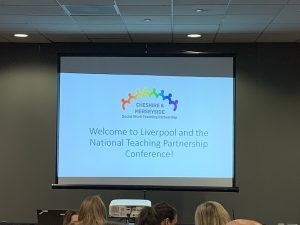A Day in the Life of a Social Worker during the COVID-19 Pandemic
Charlotte Young, Advanced Social Work Practitioner
Sheffield City Council Children’s Disability Service
I start the working day after having breakfast in my kitchen by going to my office (which is my kitchen) having said goodbye to my partner who goes up to the spare room, who also works for Sheffield City Council.
My first video call of the day is to a great grandmother who shows me two young children on an unannounced video call. The children are happy and it is the first time I have got to see the younger child sit at a table and draw. The great grandmother doesn’t realise that the sound isn’t working on the video call and has a long conversation with me that I cannot hear. When I call her back she advises me she was trying to show me the eldest child’s presents that she got for her birthday today.
I then attend a morning team meeting on Zoom and it is really good to see colleagues again. I even feel like I am back at work with the team when I hear the office fire alarm go off for a test. During this call my cat also wants to join the team meeting and puts her face on the camera!
Next, I have a video visit to a family of four. The eldest child can only say a few words verbally due to his additional needs. However today, he played a piano on his iPad very loudly for both me and my neighbours.
I have a bad feeling when I see two children who are on child protection plans for physical abuse when the youngest child has a cut and swollen lip, however she proceeds to tell me that she isn’t happy as a younger boy in school pushed her over and she starts showing me the grazes on her knee.
I then do a virtual child protection visit and I don’t need to ask to speak to the children on their own as they have already walked off with the phone to speak to me.
After this, another video call this time to a three year old in an adoptive placement. He tries to play a game to see how far up the stairs he can go before I can’t see him on the screen. After he comes back down to speak to me, I have a view, I wouldn’t usually have, up his nose, as he has pressed his face against the phone camera.
Into the afternoon now, I ask to see one of the children on a video call and mum starts walking upstairs to show me, however I don’t think the grandfather was too happy to appear on the video call as the mother also shows me her father who is trying to sleep in bed.
There is a benefit of doing a video calls to one teenager as I can now see them without needing a second worker with me. The family has just moved into a new home and whilst I don’t normally get to see the girls’ bedroom she shows me round the house and her new bedroom. The girl is with her mum and insists on me playing a game with her (Kazuit I think?!). Though I cannot see the questions on the screen she insists that I give her answers. I had clearly been on the video call for a while as the cat comes up to me and starts meowing for attention.
Whilst video calls are not the same as home visits, you can pick up on some body language and behaviour. During one video call to see two children, I notice that the mum is sat down at the other side of the room appearing very quiet and looking unhappy. After some more chat and questions mum says there has been a domestic abuse incident. So whilst I am waiting for two duty workers to visit the home my virtual contact with the mother continues. Both she and one of the children become distressed and I have to help them calm down. The duty workers visit and have a socially distanced conversation with mother and a safety plan is put in place.
It’s getting late now and I do a video call to a teenager who is non-verbal and does not use any Makaton signs and symbols or other communication symbols. This is mainly a one way conversation – however it is clear he is happy during the conversation as he is smiling into the screen. The conversation is hijacked a few times by his younger brother who keeps popping his head in front of the screen.
Finally, I do one of my frequent video calls to a young child who has global developmental delay (when children are significantly delayed in their cognitive and physical development). His mother tries to get him to look at the screen and wave but he is more interested in ‘Mr Tumble’ on TV. But mum is excited to show me the child signing a dinosaur.
I end the day switching off my laptop and making the short commute to the kettle.













